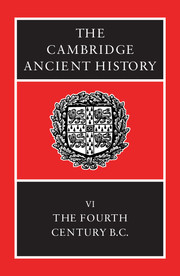Book contents
- Frontmatter
- 1 Sources and their uses
- 2 Sparta as victor
- 3 Persia
- 4 The Corinthian War
- 5 Sicily, 413–368 B.C.
- 6 The King's Peace and the Second Athenian Confederacy
- 7 Thebes in the 360s B.C.
- 8 Regional surveys I: Persian lands and neighbours
- 9 Regional surveys II: the West and North
- 10 Society and economy
- 11 The polis and the alternatives
- 12 Greek culture and science
- 13 Dion and Timoleon
- 14 Macedon and north-west Greece
- 15 Macedonian hegemony created
- 16 Alexander the Great Part 1: The events of the reign
- 17 Alexander the Great Part 2: Greece and the conquered territories
- 18 Epilogue
- Chronological Table
- BIBLIOGRAPHY
- Index
- Map 1: Greece and Western Asia Minor
- Map 9: Egypt
- Map 20: Alexanders campaigns
- References
7 - Thebes in the 360s B.C.
Published online by Cambridge University Press: 28 March 2008
- Frontmatter
- 1 Sources and their uses
- 2 Sparta as victor
- 3 Persia
- 4 The Corinthian War
- 5 Sicily, 413–368 B.C.
- 6 The King's Peace and the Second Athenian Confederacy
- 7 Thebes in the 360s B.C.
- 8 Regional surveys I: Persian lands and neighbours
- 9 Regional surveys II: the West and North
- 10 Society and economy
- 11 The polis and the alternatives
- 12 Greek culture and science
- 13 Dion and Timoleon
- 14 Macedon and north-west Greece
- 15 Macedonian hegemony created
- 16 Alexander the Great Part 1: The events of the reign
- 17 Alexander the Great Part 2: Greece and the conquered territories
- 18 Epilogue
- Chronological Table
- BIBLIOGRAPHY
- Index
- Map 1: Greece and Western Asia Minor
- Map 9: Egypt
- Map 20: Alexanders campaigns
- References
Summary
Thebes’ victory at Leuctra allowed it to attract allies and wield influence in many parts of the Greek world. It moved quickly from a position of relative weakness to become a leading power in Greek inter-state politics, acting in central Greece, Thessaly and Macedon, the Peloponnese, and – briefly – the Aegean. The available evidence of Theban activity in these various regions is very uneven. Information is richest on events in the Peloponnese, because Xenophon, who gives the fullest ancient account of the 360s, concentrates on Peloponnesian affairs to the neglect of other parts of Greece. Even on Peloponnesian affairs Xenophon is partisan in his judgments, both political and social, and also omits major events of the first importance, such as the liberation of Messenia. None the less his account, taken in conjunction with other available evidence, offers a quantity of information on Peloponnesian affairs that we do not possess for other areas. Much remains uncertain even in Peloponnesian history, but even more in the history of other Greek areas in these years.
The opportunities which opened up for Thebes in the aftermath of Leuctra were great and tempting, but not all predictable. In the Peloponnese Sparta had for long done what it could to prevent unwelcome change. Resentment had none the less developed among Peloponnesian states on a great number of issues; some of these were particular matters, such as Elis’ claim to Triphylia and Mantinea's desire to refound her urban centre, while others were wider, such as a wish to create an Arcadian federal state.
- Type
- Chapter
- Information
- The Cambridge Ancient History , pp. 187 - 208Publisher: Cambridge University PressPrint publication year: 1994
References
- 16
- Cited by



